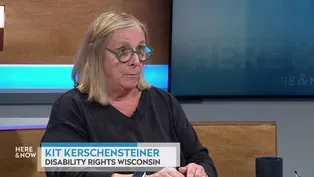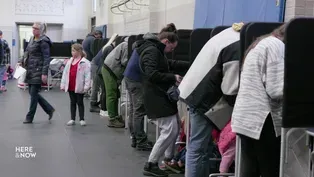Here and Now
Barbara Bowers on Nonprofit Nursing Homes Turning For-Profit
Clip: Season 2300 Episode 2305 | 6m 20sVideo has Closed Captions
Barbara Bowers on growing numbers of nursing homes changing from nonprofit to for-profit.
UW-Madison School of Nursing Center for Aging Research and Education founding director Barbara Bowers discusses the growing number of Wisconsin nursing homes changing from nonprofit to for-profit.
Problems with Closed Captions? Closed Captioning Feedback
Problems with Closed Captions? Closed Captioning Feedback
Here and Now is a local public television program presented by PBS Wisconsin
Here and Now
Barbara Bowers on Nonprofit Nursing Homes Turning For-Profit
Clip: Season 2300 Episode 2305 | 6m 20sVideo has Closed Captions
UW-Madison School of Nursing Center for Aging Research and Education founding director Barbara Bowers discusses the growing number of Wisconsin nursing homes changing from nonprofit to for-profit.
Problems with Closed Captions? Closed Captioning Feedback
How to Watch Here and Now
Here and Now is available to stream on pbs.org and the free PBS App, available on iPhone, Apple TV, Android TV, Android smartphones, Amazon Fire TV, Amazon Fire Tablet, Roku, Samsung Smart TV, and Vizio.
Providing Support for PBS.org
Learn Moreabout PBS online sponsorship>> Reporting from the state capitol for "Here& Now", I'm Steven Potter.
>> Turning to health news, the SSM Health System recently announced plans to sell three of their nonprofit nursing homes in Wisconsin to a for profit company based in new Jersey, an employee at one of those facilities shared with here and Now.
A letter from the staff to management saying they did not lead this process with integrity or transparency, and the residents, families and staff suffered the brunt of the consequences as a result.
Now, the sale may be part of a larger nationwide trend of nonprofit nursing homes being sold to for profit entities.
The uptick is concerning for health workers and patients as the centers for Medicare and Medicaid.
Say for profit facilities on average, have lower staffing and worse quality of care.
Joining us to discuss this is Barbara Bowers, founding director of the UW-Madison School of Nursing's center for Aging Research and Education.
And thanks very much for being here.
So what do you think about the trend of for profit entities buying not for profit facilities?
>> Yeah, there's a lot involved in that.
There have always been a majority of for profit facilities.
But as you've said, the trend is increasing.
There's more and more for profit and fewer and fewer not for profit.
So one of the issues I mean, part of the question is why the not for profits are getting out of the business and there is a, an issue, I think, with general reimbursement from state and federal agencies.
And that would be mostly Medicare and Medicaid.
put into the system to provide the kind of care, both quality of care and quality of life for people.
That's part of it.
So if you want to take an organization that doesn't have enough money to begin with in terms of the reimbursement level and make a profit, you've got to get it from somewhere.
And what we've seen is that where it comes from is largely labor, and as you've said, the staffing is lower in for profit organizations.
And I think for the staffing level is vital, not just for the quality of care, the outcomes that we measure on a regular basis, but also quality of life.
Do you have people who answer a call light, and how long does it take them?
Are there people to talk to?
Can you are there activities that are interesting and engaging to you?
Or is it sort of the bingo for everybody?
Every night, >> so staffing shortages have been described by people, including yourself, as a crisis, how bad is it and what are the effects even over quality of life?
>> Yeah.
contribute to this.
>> I always say to people recruitment, which is what tends to be the focus.
We need more staff.
We need to find more staff.
There's not enough people available.
All of that is true.
But if we retained staff at a higher rate, we wouldn't have to worry so much about recruiting national averages for turnover rates for the direct care workers, the CNAS is about 70%.
For nurses, it's about 40%.
Directors of nursing come and go very quickly as well, any business and people who are out there who who run businesses know that if you have a turnover rate of 70%, your organization is in trouble.
So it causes huge disruptions.
It's also really important issue for the residents because they get to know people.
They get to know the staff.
These become their surrogate families.
And when it's constantly turning over, they're losing these connections.
These important relationships, so I think we need to really focus a lot more on retention.
What does it take to keep staff there?
And there's actually been a fair amount of research on that.
And I don't think it's very widely used.
>> So just late this week, Governor Tony Evers announced the state will invest nearly $260 million of Covid relief money to fund wage increases to direct care workers in places like this and for nursing homes.
>> I think there is a huge and I have to say that home care workers tend to get less pay even than nursing home workers, and their benefits are less, which is also another distinction between, in general, for profit and not for profit homes.
Is, the for profit have generally lower levels of benefits.
So, I that's wonderful that he's putting money into that, if you look at the research on staff turnover, it's not exclusively or even primarily money.
I mean, people know what money they're getting when they go into it.
It's not great.
They could get more money, probably at a fast food restaurant.
These are people who are really committed to what they're doing.
They believe in what they're doing.
They love what they're doing, and so the money is not the most important thing.
I'm certainly not saying they shouldn't get an increase.
They certainly need a wage increase.
On the other hand, there are a lot of other things that drive people out.
Part of it is supervisors, people who supervise them, who don't have supervisor training.
And that doesn't sound like a big deal, but it is.
I mean, I know in, the research has been done on turnover in every industry shows that the direct supervisor is the most important factor for whether or not people stay in their job.
So that that I think we need more more of better quality.
And also training of the staff.
Staff are not always well, well enough trained to take care of the people.
They're taking care of, people leave because of the low staffing level.
I've had so many CNAs tell me that the reason they left is at the end of the day.
When they went home, they felt really bad about I left.
I mean, I remember one woman who said, I put Edith on the toilet, and I said, I'll be back in five minutes.
And I never went back.
I got so busy, distracted, I never.
And she woke up in the middle of the night horrified, not knowing what had happened to this person, those are the sorts of things that drive people out.
>> What is your advice to families needing long term care in this current landscape?
>> I would look at turnover rates in the nursing home, if the retention rate, the turnover rates are low, the retention rates are high.
That says something about the quality of the entire environment.
the entire environment.
Here & Now opening for August 2, 2024
Video has Closed Captions
The introduction to the August 2, 2024 episode of Here & Now. (1m 22s)
In Focus with Stephen Kantrowitz: Keeping History Present
Video has Closed Captions
Murv Seymour talks with Stephen Kantrowitz about the importance of learning about history. (33m 17s)
Kit Kerschensteiner on Absentee Voting by Disabled People
Video has Closed Captions
Kit Kerschensteiner on a court ruling that allows emailing ballots to disabled voters. (5m 14s)
Trump and Alarm Over the Future of Democracy in America
Video has Closed Captions
Critics of Donald Trump warn that democracy is on the ballot in the 2024 election. (7m 50s)
Vel Phillips Honored With Statue at Wisconsin State Capitol
Video has Closed Captions
A statue of Vel Phillips was unveiled at the Wisconsin State Capitol to honor her legacy. (37s)
Who Gets to Decide How Federal Money for Wisconsin is Spent?
Video has Closed Captions
Two proposed state constitutional amendments would shift power to direct federal funding. (4m 19s)
Providing Support for PBS.org
Learn Moreabout PBS online sponsorshipHere and Now is a local public television program presented by PBS Wisconsin

















